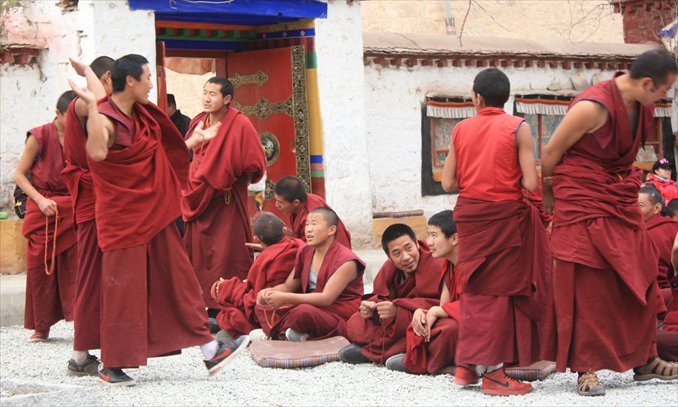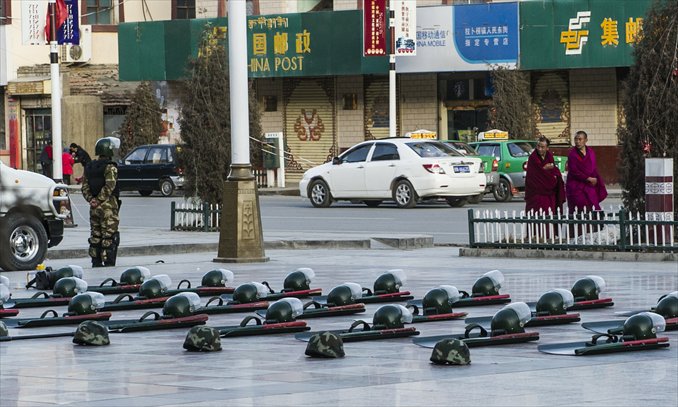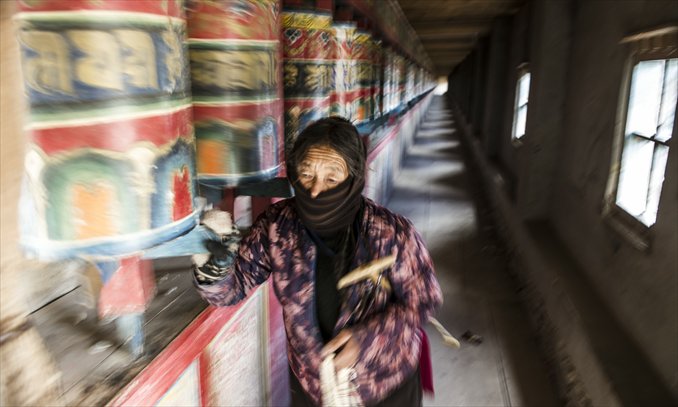Trained in patriotism

Tangga scrolls hang from the walls of Ngawang Tobjor's room. Next to these exquisitely painted deities and patterns is a golden-framed picture of four generations of Chinese presidents from Mao Zedong to Hu Jintao.
Every monk's dorm room at Deprung Monastery in western Lhasa has such a picture, as in thousands of other monasteries. They are part of a regional campaign started at the end of 2011 which has sent national flags, portraits of leaders, television programs and newspapers to monasteries.
The authorities hope to improve management and maintain stability through education, management and the provision of services. So far the measures appear to have been effective, as no unrest among monks has happened in Tibet since the riot on March 14, 2008, when a group smashed, looted and burned down stores and vehicles, killing 18 and injuring 382 civilians in Lhasa.
Ngawang is the honorary director of Derpung's management committee, which consists of 12 elected monks and 13 government-appointed officials. There are over a dozen additional officials stationed in the monastery, which has less than 500 monks.
The monks and the officials get along fine,Ngawang said through a translator.
Asked whether it feels strange to have portraits of presidents in a religious setting, Ngawang simply smiled and said that every household in the Tibetan Autonomous Region was given such a picture.
Officials say they don't force the monks to hang up the portraits and don't force them to do anything else. They consult with the monks on the committee for every decision, and even with all the monks in a given monastery for major decisions.
"Respect and sincerity are key to our work," said Tashi Tsering, who is in charge of education and social insurance. As Tashi patrols the monastery, he smiles and greets monks, who smile back or stop for a chat.
Getting to know the monks
It hasn't always been easy, said Tashi. When he first started working in the monastery in 2007, the monks weren't very cooperative. There were over 1,000 monks at the time, about half of whom came from outside Tibet and were dispersed after the unrest in March 2008.
"Some monks wouldn't let us into their rooms; sometimes they would stare us down or verbally abuse us," he said.
There was no other way to turn them around but to persevere and make them realize the officials are really trying to be helpful, said Tashi.
"You have to be very careful when you work with the monks," said Tashi. Details are important, he said.
"In the beginning, when I was told to go talk to the monks, I would dutifully carry a notebook and a pen," said Tashi. "But I quickly learned that the monks don't feel comfortable when they know what they say will be recorded, so I stopped doing that."
As part of the new measures enforced in late 2011, the authorities introduced social welfare policies such as medical insurance, pensions and free physical checkups. Heavy investments also poured into building or improving infrastructure and utilities at monasteries.
More bilingual government officials - who speak both Tibetan and Chinese - were assigned to monasteries, with an important part of their job being to befriend every monk and get to know them personally.
Each official is assigned several to sometimes over a dozen monks, chatting with them regularly, getting a sense of what they are thinking, and helping solve any problems they might have.
Ngawang Targye, a 41-year-old monk at Derpung, developed a condition in his legs last August and fell critically ill. Officials arranged for him to be transferred to a hospital in Chengdu where he had his left leg amputated.
Officials also coordinated with the civil affairs bureau and the local federation for the disabled to cover his medical bills and get him a free prosthetic leg.
Officials also regularly visit monks' families to keep them informed of the situation at the monasteries, and ask if they need any help. "We then coordinate with local authorities to help solve problems with housing, education or employment, for instance," said Tashi, who, like many officials, believes that such services have helped to win over the monks and their families.
Patriotic education
Besides providing services, education is another crucial part of monastery management. Although patriotic education was launched in Tibetan monasteries as early as 1996 after long-term unrest, efforts have been inconsistent.
Legal and patriotic education was added to the "curriculum" and more strictly enforced after the 2008 unrest.
The monks are usually divided into study groups that have weekly or biweekly study sessions and gather together for a lecture every month. They are required to study China's laws and regulations, especially those related to religious affairs, and also keep up with other important political events such as the 18th CPC National Congress that elected the ruling party's new leaders last year.
Such study sessions are arranged to avoid conflicting with the monks' daily religious activities or important festivals, officials at the monasteries say. On occasion, monks are asked to write an essay about what they have learned and their thoughts about it.
"Monks are citizens too, and every citizen has to learn and understand the laws," said Norbu Dondrup, who is in charge of education at Sera Monastery in Lhasa. "It's not something we force on the monks, but it's as it should be."
At first some monks may be reluctant to learn, but it was necessary because some people make mistakes simply because they were ignorant of the law, said Norbu.
On the morning of March 5, after finishing their prayers, all monks in Tibet were asked to watch the opening ceremony of the country's legislative meeting in Beijing.
The monks at Sera chant from early morning to late at night, study scripture in the morning and debate religious affairs in the afternoon. Despite a full schedule, the legal and patriotic education is not an added burden, and they have gotten used to it, said Karma Chophel, a monk at the Sera Monastery, through an official translator.
When asked what they think of patriotic education without the presence of officials, some monks who speak little Chinese said "it's alright" or chuckled and walked away.
Pros and cons
Monasteries that remain stable and have had no major or minor incidents are also rewarded.
Tashilhunpo Monastery in Shigatse, for instance, has collected over 12 million yuan ($1.93 million) in awards during the past two years, which means that every monk got an average of 140,000 yuan per year, according to Dawa Chonda, deputy director at the monastery's management committee.
In comparison, there has been about 100 self-immolation cases, mostly in the Tibetan areas in the neighboring provinces such as Sichuan and Gansu in the past two years. Although authorities in these provinces have adopted similar measures to manage the monasteries, some young monks in Gannan, Gansu Province expressed dislike for the officials stationed at their monasteries.
Part of the reason is that authorities haven't paid enough attention to the management of monks and monasteries as the problems weren't prominent in these areas in the past, explained Zhu Xiaoming, a researcher at the China Tibetology Research Center. There is also growing influence from overseas in these areas outside Tibet itself, Zhu added.
While communication signals are often blocked in Tibetan areas of Sichuan and Gansu, there appears to be no such restrictions in Lhasa or Shigatse.
Almost all monks have smart phones - many of them flashing iPhones - and there are many channels for them to obtain information, said Norbu at Sera Monastery. "It's impossible to block information; it's better to educate them and influence them gradually," he said. Most monks in Tibet are aware of such cases and disapprove of self-immolation, he added.
On March 11, RFA quoted a source from the Indian-based Tibetan Center for Human Rights and Democracy, saying that a special team of experts were sent to Tibet to check the cell phones of all the monks for contents or pictures that are deemed "dangerous to national security."
In response to the Global Times' inquiry, officials from Derpung Monastery and the United Front Work Department denied the accusation on Tuesday.
But peaceful as the situation may seem in Tibet, there are many reminders of the tension that remains five years after the unrest.
Officials are on duty 24/7 and are extra cautious in March. As monks go about their activities as usual, officials and police are divided into groups and assigned to patrol different locations, such as the gates, the main shrines or the parking lots, and are required to report back at the end of their shifts.
Officials at the Jokhang Monastery management committee declined an interview request due to "the sensitive timing." Last May two Tibetans set themselves on fire outside the monastery.
The area around Jokhang Monastery is heavily guarded. Security checkpoints are set up in entrances to the square outside the monastery and nearby Barkhor Street. People entering the area undergo baggage checks and random ID checks are in place. Water bottles are examined and lighters left at the entrance.
Gun-toting SWAT teams and armed police patrol the street in groups of six while security guards with walkie-talkies are stationed inside the monastery.
Even at Tashilhunpo Monastery in Shigatse, the seat of the Panchen Lama and historically a patriotic monastery, officials who are confident about Tashilhunpo's political standing remain diligent concerning patrols and education.
"It's necessary to prevent any problems and to be always on guard against the disruption of the Dalai clique," said Dawa.
Zhu headed a research project after the 2008 unrest on the management of Tibetan monasteries. He said a lot of progress has been made and for now the management has proved effective. "But it takes time to reach the level of harmony and stability we are aiming for," he added.

